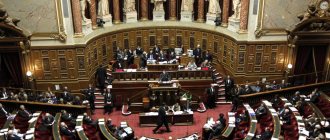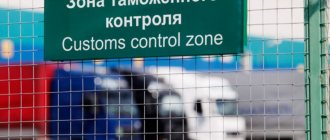ST 173.1 of the Criminal Code of the Russian Federation.
1. Formation (creation, reorganization) of a legal entity through nominees, as well as submission to the body that carries out state registration of legal entities and individual entrepreneurs, data, which entailed the entry of information about nominees into the unified state register of legal entities -
shall be punishable by a fine in the amount of one hundred thousand to three hundred thousand rubles, or in the amount of the wages or other income of the convicted person for a period of seven months to one year, or by forced labor for a term of up to three years, or by imprisonment for the same term.
2. The same acts committed: a) by a person using his official position; b) by a group of persons by prior conspiracy - shall be punishable by a fine in the amount of three hundred thousand to five hundred thousand rubles, or in the amount of the wages or other income of the convicted person for a period of one to three years, or by compulsory labor for a period of one hundred eighty to two hundred and forty hours. , or imprisonment for a term of up to five years.
Note : In this article and Article 173.2 of this Code, figureheads are understood as persons who are founders (participants) of a legal entity or management bodies of a legal entity and, through misrepresentation or without whose knowledge, data about them was entered into the unified state register of legal entities, as well as persons who are management bodies of a legal entity and who do not have the goal of managing the legal entity.
Commentary to Art. 173.1 Criminal Code
1. In Art. 173.1 and 173.2 of the Criminal Code provide for liability for the creation of shell companies. Persons who use other people's documents to form such legal entities are subject to criminal liability under Art. 173.1 of the Criminal Code, who provided them - under Art. 173.2 of the Criminal Code.
2. The objective side is characterized by alternative forms of action, consisting in the formation (creation, reorganization) of a legal entity through dummies or in the submission to the body that carries out state registration of legal entities and individual entrepreneurs, data, which entailed the entry into the Unified State Register of Legal Entities of information about dummies faces.
3. The crime is recognized as completed from the moment the registration authority makes the corresponding entry in the state register of legal entities and individual entrepreneurs.
Article 173.1. Illegal formation (creation, reorganization) of a legal entity
Determination of the Constitutional Court of the Russian Federation dated June 30, 2020 N 1424-O The special rule enshrined in part one.1 of Article 108 of the Code of Criminal Procedure of the Russian Federation, according to which detention as a preventive measure in the absence of the circumstances specified in paragraphs 1 - 4 of part one of the same article, cannot be applied against a suspect or accused of committing crimes provided for in parts one through four of Article 159, Articles 159.1 - 159.3, 159.5, 159.6, 160, 165 and 201 of the Criminal Code of the Russian Federation, if these crimes were committed by an individual entrepreneur in connection with his entrepreneurial activity and (or) management of property belonging to him, used for the purposes of entrepreneurial activity, or if these crimes are committed by a member of the management body of a commercial organization in connection with the exercise of his powers to manage the organization or in connection with the commercial organization’s implementation of entrepreneurial or other economic activities, and also parts five - seven of article 159, articles 171, 171.1, 171.3 - 172.3, 173.1 - 174.1, 176 - 178, 180, 181, 183, 185 - 185.4 and 190 - 199.4 of the Criminal Code of the Russian Federation, is an additional guarantee of the constitutional right to freedom and personal integrity (rulings of the Constitutional Court of the Russian Federation dated February 24, 2011 N 250-О-О, dated November 20, 2014 N 2637-О, etc.).
Determination of the Constitutional Court of the Russian Federation dated July 23, 2020 N 1863-O
According to part one.1 of article 108 of the Code of Criminal Procedure of the Russian Federation, detention as a preventive measure in the absence of the circumstances specified in paragraphs 1 - 4 of part one of the same article cannot be applied to a suspect or accused of committing crimes provided for in parts one - fourth article 159, articles 159.1 - 159.3, 159.5, 159.6, 160, 165 and 201 of the Criminal Code of the Russian Federation, if these crimes were committed by an individual entrepreneur in connection with his business activities and (or) management of property belonging to him, used for business purposes, or if these crimes were committed by a member of the management body of a commercial organization in connection with the exercise of powers by him to manage the organization or in connection with the implementation by a commercial organization of entrepreneurial or other economic activities, as well as parts five - seven of Article 159, Articles 171, 171.1, 171.3 - 172.3, 173.1 - 174.1, 176 - 178, 180, 181, 183, 185 - 185.4 and 190 - 199.4 of the Criminal Code of the Russian Federation. This special norm of the criminal procedural law is an additional guarantee of the constitutional right to freedom and personal integrity (rulings of the Constitutional Court of the Russian Federation of February 24, 2011 N 250-О-О, of November 20, 2014 N 2637-О, etc.).
Determination of the Constitutional Court of the Russian Federation dated February 26, 2021 N 328-O
The special rule enshrined in part one.1 of Article 108 of the Code of Criminal Procedure of the Russian Federation, according to which detention as a preventive measure in the absence of the circumstances specified in paragraphs 1 - 4 of part one of the same article, cannot be applied to a suspect or accused of committing crimes provided for in parts one to four of Article 159, Articles 159.1 - 159.3, 159.5, 159.6, 160, 165 and 201 of the Criminal Code of the Russian Federation, if these crimes were committed by an individual entrepreneur in connection with his business activities and (or) management of property owned by him and used for the purposes of entrepreneurial activity, or if these crimes were committed by a member of the management body of a commercial organization in connection with the exercise of powers by him to manage the organization or in connection with the implementation by a commercial organization of entrepreneurial or other economic activities, as well as parts five to seven of Article 159, Articles 171, 171.1 171.3 - 172.3, 173.1 - 174.1, 176 - 178, 180, 181, 183, 185 - 185.4 and 190 - 199.4 of the Criminal Code of the Russian Federation, is an additional guarantee of the constitutional right to freedom and personal integrity (determination of the Constitutional Court of the Russian Federation of February 24, 2011, 2011 year N 250-О-О, dated November 20, 2014 N 2637-О, etc.).
Determination of the Constitutional Court of the Russian Federation dated March 25, 2021 N 383-O
According to part one.1 of article 108 of this Code, detention as a preventive measure in the absence of the circumstances specified in paragraphs 1 - 4 of part one of the same article cannot be applied to a suspect or accused of committing crimes provided for in parts one - fourth article 159, articles 159.1 - 159.3, 159.5, 159.6, 160, 165 and 201 of the Criminal Code of the Russian Federation, if these crimes were committed by an individual entrepreneur in connection with his business activities and (or) management of property belonging to him, used for business purposes, or if these crimes were committed by a member of the management body of a commercial organization in connection with the exercise of powers by him to manage the organization or in connection with the implementation by a commercial organization of entrepreneurial or other economic activities, as well as parts five - seven of Article 159, Articles 171, 171.1, 171.3 - 172.3, 173.1 - 174.1, 176 - 178, 180, 181, 183, 185 - 185.4 and 190 - 199.4 of the Criminal Code of the Russian Federation. This special norm of the criminal procedural law is an additional guarantee of the constitutional right to freedom and personal integrity (rulings of the Constitutional Court of the Russian Federation of February 24, 2011 N 250-О-О, of November 20, 2014 N 2637-О, etc.).
Resolution of the Presidium of the Supreme Court of the Russian Federation dated November 13, 2019 N 31-P19
according to Part 1 of Art. 173.1 of the Criminal Code of the Russian Federation to imprisonment for a period of 1 year 6 months; according to Part 4 of Art. 159 of the Criminal Code of the Russian Federation (for a crime committed in the period from October 30 to December 31, 2014) to imprisonment for 4 years 10 months with restriction of freedom for a period of 1 year, with the establishment of restrictions and the imposition of obligations listed in the sentence,
Determination of the Judicial Collegium for Criminal Cases of the Supreme Court of the Russian Federation dated December 26, 2017 N 19-UD17-38
- according to Part 1 of Art. 173.1 of the Criminal Code of the Russian Federation to 1 year 6 months of imprisonment; - according to Part 4 of Art. 159 of the Criminal Code of the Russian Federation (for a crime committed in the period from October 30 to December 31, 2014) to 4 years 10 months of imprisonment, with restriction of freedom for 1 year (limitations are established in the sentence);
Resolution of the Presidium of the Supreme Court of the Russian Federation dated September 22, 2021 N 88P21
According to the verdict of the Oktyabrsky District Court of Rostov-on-Don dated August 17, 2022, Skorovarov A.I. convicted of a combination of crimes provided for in paragraphs “a, b”, part 2 of Art. 172, part 2 art. 187, paragraph “b”, part 2, art. 173.1 of the Criminal Code of the Russian Federation, on the basis of Part 3 of Art. of the Criminal Code of the Russian Federation to imprisonment for a period of 2 years 1 month in a general regime correctional colony. Preventive measure for A.I. Skorovarov in the form of detention was left unchanged. The term of serving the sentence was decided to be calculated from August 17, 2022 and the time of detention of A.I. Skorovarov was included in it. in custody in the period from April 28, 2017 to the day the sentence entered into legal force at the rate of one day of detention for one and a half days of imprisonment in a general regime correctional colony.
Resolution of the Plenum of the Supreme Court of the Russian Federation dated June 11, 2020 N 7
This norm establishes a ban on the use of a preventive measure in the form of detention in the absence of the circumstances specified in paragraphs 1 - 4 of part 1 of Article 108 of the Code of Criminal Procedure of the Russian Federation in relation to a suspect or accused of committing crimes provided for in parts 5 - 7 of Article 159, Articles 171 , 171.1, 171.3 - 172.3, 173.1 - 174.1, 176 - 178, 180, 181, 183, 185 - 185.4, 190 - 199.4 of the Criminal Code of the Russian Federation, without any other conditions, and in relation to a suspect or accused of committing crimes provided for in parts 1 - 4 of Article 159, Articles 159.1 - 159.3, 159.5, 159.6, 160, 165 and 201 of the Criminal Code of the Russian Federation, - provided that these crimes were committed by an individual entrepreneur in connection with his business activities and (or) management of property owned by him, used for the purposes of entrepreneurial activity, or if these crimes were committed by a member of the management body of a commercial organization in connection with the exercise of his powers to manage the organization or in connection with the implementation of entrepreneurial or other economic activities by a commercial organization.
Second commentary to Art. 173.1 of the Criminal Code of the Russian Federation
1. The objective side is:
1) in the formation (creation, reorganization) of a legal entity through nominees;
2) in the submission to the body that carries out state registration of legal entities and individual entrepreneurs, data that entailed the inclusion of information about nominees in the unified state register of legal entities.
2. According to Art. 48 of the Civil Code, a legal entity is recognized as an organization that has separate property and is responsible for its obligations, can, on its own behalf, acquire and exercise civil rights and bear civil obligations, and be a plaintiff and defendant in court. A legal entity must be registered in the unified state register of legal entities in one of the organizational and legal forms provided for by the Civil Code.
3. The concept of dummy persons is given in the footnote to the article: these are persons who are the founders (participants) of a legal entity or the management bodies of a legal entity and through misrepresentation or without whose knowledge data about them was entered into the unified state register of legal entities, as well as persons who are management bodies of a legal entity and who do not have the goal of managing the legal entity.
4. The crime is completed from the moment the procedure for forming a legal entity is completed.
5. The submission to the body that carries out state registration of legal entities and individual entrepreneurs of data, which entails the entry into the Unified State Register of Legal Entities of information about figureheads, is understood to mean the actual provision to the registration body of information about the above-mentioned figureheads as founders (participants) of a legal entity or its management bodies .
6. The crime is completed from the moment when information about the dummies is entered into the Unified State Register of Legal Entities.
7. The subjective side is characterized only by direct intent.
8. Subject - a person who has reached the age of 16 years.
9. Qualifying characteristics are provided for in Part 2 of the article.
Illegal use of documents for the formation (creation, reorganization) of a legal entity
1. Providing an identification document or issuing a power of attorney, if these actions were performed to enter information about a dummy person into the unified state register of legal entities,
is punishable by a fine in the amount of one hundred thousand to three hundred thousand rubles or in the amount of the wages or other income of the convicted person. for a period of seven months to one year, or by compulsory work for a period of one hundred eighty to two hundred and forty hours, or by corrective labor for a period of up to two years.
2. Acquisition of an identity document, or use of personal data obtained illegally, if these acts were committed to enter information about a figurehead into the unified state register of legal entities -
shall be punishable by a fine in the amount of three hundred to five hundred thousand rubles, or in the amount of the wages or other income of the convicted person for a period of one to three years, or by forced labor for a term of up to three years, or by imprisonment for the same term.
Note.
In this article, the acquisition of an identity document means its receipt on a paid or gratuitous basis, the appropriation of a found or stolen identity document, as well as its acquisition by deception or abuse of trust.


